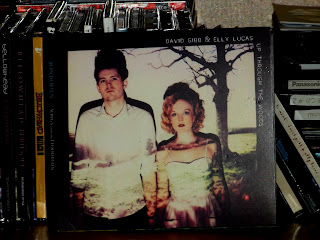Jamie Smith's Mabon comprises five of Wales' finest folk
musicians. Together Jamie Smith, Oliver Wilson-Dickson, Adam Rhodes, Iolo
Whelan and Matthew Downer create a sound that is traditional yet
original. Known for their lively tunes and fantastic original material,
this Welsh band is definitely one to see live. The evening included tunes and
songs influenced by music styles from all around the world intertwined with
Welsh Celtic music. Their 'Taith Adre' tour has visited venues only in Wales
and is therefore a celebration of the welsh roots of the band.
The evening began with the toe tapping tune set ‘Huzzah’. The
rhythmic bouzouki accompaniment blended perfectly with Jamie Smith’s expert
accordion playing. It was masterfully played and a lovely way to start the set.
Jamie Smith possesses a smooth and distinctive voice, that
complements his songwriting perfectly. He sang the song ‘Summer’s Lament’ which
is very fitting for this time of year in Wales. The song is all about the
disappointment of winter and is an incredibly pleasant and relaxing song to
listen to, although it does not contain a poignant message. Jamie also sang the
song ‘Lady of the Woods’ and requested audience participation. A large
proportion of the audience joined in with the catchy chorus which definitely
added to the song. The song is about fantasy stories and contains lovely lyrics
and a very memorable tune.
They played the atmospheric tune ‘The Tale of Nikolai’ which
Oliver claimed he notated on a piece of bark using stones whilst listening to
it being played in a cave in Russia! This tune is very dramatic sounding and
Oliver’s intricate violin playing is delicate yet powerful. This was followed
by the best musical sales pitch I have ever heard, reminding the audience of
the merchandise for sale.
It is a shame that there was a lack of space for dancing
otherwise I’m sure many people would have been inclined to get on their feet
during the very lively, danceable tune sets. ‘The Gordano Ranter’ is certainly
one of these tunes. One of Jamie’s finest compositions, in my opinion, this
tune was written after an interesting incident in a service station in Gordano.
My favourite track played during the evening was ‘Caru Pum Merch’.
This beautiful song in Welsh is about loving a women through the five stages of
her life. Its mysterious instrumentation makes the song very atmospheric and
interesting to listen to. The song begins acoustically with Oliver on violin
and Jamie’s clear vocals. The addition of percussion instruments by Iolo Whelan,
and Matthew Down’s bass playing, counterpoint this very traditional sounding
melody but do not create a fusion sound. Instead they are more subtle in
creating a dark backdrop for the melody. Overall, it creates a rather beautiful
effect.
Link to Jamie Smith's Mabon website : http://www.jamiesmithsmabon.com/






















